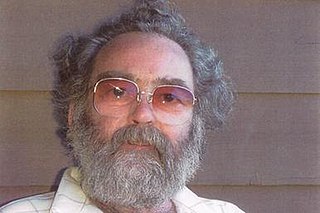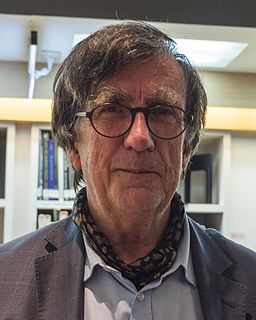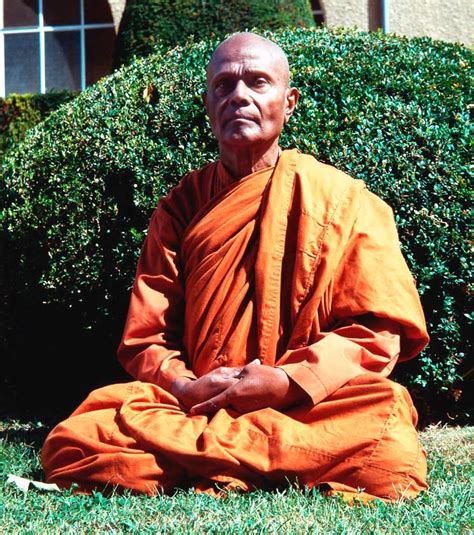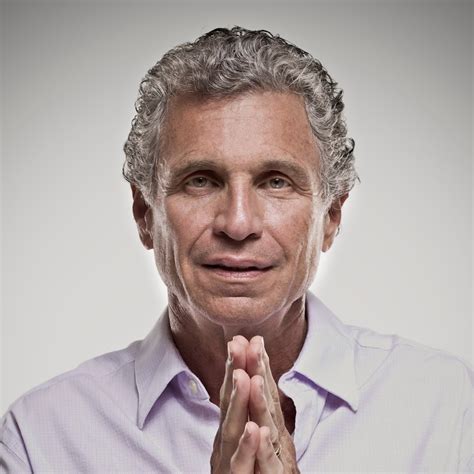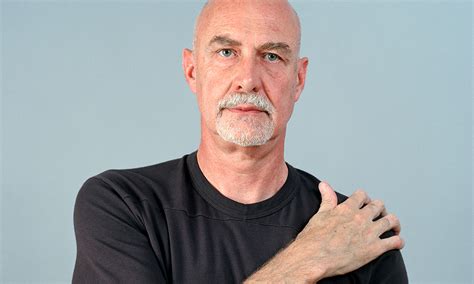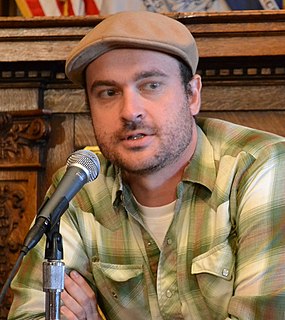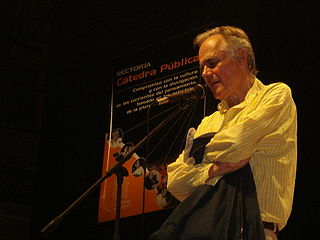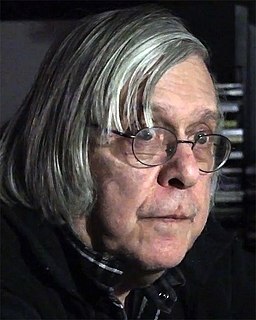Top 1200 Augmented Reality Quotes & Sayings - Page 20
Explore popular Augmented Reality quotes.
Last updated on April 19, 2025.
One might suppose that reality must be held to at all costs. However, though that may be the moral thing to do, it is not necessarily the most useful thing to do. The Greeks themselves chose the ideal over the real in their geometry and demonstrated very well that far more could be achieved by consideration of abstract line and form than by a study of the real lines and forms of the world; the greater understanding achieved through abstraction could be applied most usefully to the very reality that was ignored in the process of gaining knowledge.
There's no real objection to escapism, in the right places... We all want to escape occasionally. But science fiction is often very far from escapism, in fact you might say that science fiction is escape into reality... It's a fiction which does concern itself with real issues: the origin of man; our future. In fact I can't think of any form of literature which is more concerned with real issues, reality.
In all great works of fiction, regardless of the grim reality they present, there is an affirmation of life against the transience of that life, an essential defiance. This affirmation lies in the way the author takes control of reality by retelling it in his own way, thus creating a new world. Every great work of art, I would declare pompously, is a celebration, an act of insubordination against the betrayals, horrors and infidelities of life. The perfection and beauty of form rebels against the ugliness and shabbiness of the subject matter.
The various forms of education or ‘normalization’ imposed upon an individual consist in making him or her change points of subjectification, always moving towards a higher, nobler one in closer conformity with the supposed ideal. Then from the point of subjectification issues a subject of enunciation, as a function of a mental reality determined by that point. Then from the subject of enunciation issues a subject of the statement, in other words, a subject bound to statements in conformity with a dominant reality
The point is that (little-t) truth is a matter of definition relative to the grid one is using at the moment, and that (capital-T) Truth, metaphysical reality, is irrelevant to grids entirely. Pick a grid, and through it some chaos appears ordered and some appears disordered. Pick another grid, and the same chaos will appear differently ordered and disordered. Reality is the original Rorschach. Verily! So much for all that.
The fact about himself that the liar hides is that he is attempting to lead us away from a correct apprehension of reality; we are not to know that he wants us to believe something he supposes to be false. The fact about himself that the bullshitter hides, on the other hand, is that the truth-values of his statements are of no central interest to him . . . He does not care whether the things he says describe reality correctly. He just picks them out, or makes them up, to suit his purpose.
We could decide simply to remain absorbed in the mysterious, unformed, free-play of reality. This would be the choice of the mystic who seeks to extinguish himself in God or Nirvana—analogous perhaps to the tendency among artists to obliterate themselves with alcohol or opiates. But if we value our participation in a shared reality in which it makes sense to make sense, then such self-abnegation would deny a central element of our humanity: the need to speak and act, to share our experience with others.
In recent years my understanding of God had evolved into increasingly remote abstractions. I'd come to think of God in terms like Divine Reality, the Absolute, or the One who holds us in being. I do believe that God is beyond any form and image, but it has grown clear to me that I need an image in order to relate. I need an image in order to carry on an intimate conversation with what is so vast, amorphous, mysterious, and holy that it becomes ungraspable. I mean, really, how to you become intimate with Divine Reality? Or the Absolute?
As soon as you look at the world through an ideology you are finished. No reality fits an ideology. Life is beyond that. That is why people are always searching for a meaning to life. But life has no meaning; it cannot have meaning because meaning is a formula; meaning is something that makes sense to the mind. Every time you make sense out of reality, you bump into something that destroys the sense you made . Meaning is only found when you go beyond meaning.
Let’s suppose that rain washes out a picnic. Who is feeling negative? The rain? Or you? What’s causing the negative feeling? The rain or your reaction? When you bump your knee against a table, the table’s fine. It’s busy being what it was made to be – a table. The pain is in your knee, not in the table. The mystics keep trying to tell us that reality is all right. Reality is not problematic. Problems exist only in the human mind. We might add: in the stupid, sleeping human mind.
We usually do not look into what is really there in front of us. We see life through a screen of thoughts and concepts, and we mistake those mental objects for reality. We get so caught up in this endless thought-stream that reality flows by unnoticed. We spend our time engrossed in activity, caught up in an eternal flight from pain and unpleasantness. We spend our energies trying to make ourselves feel better, trying to bury our fears. We are endlessly seeking security. Meanwhile, the world of real experience flows by untouched and untasted.
To say that a thing is imaginary is not to dispose of it in the realm of mind, for the imagination, or the image making faculty, is a very important part of our mental functioning. An image formed by the imagination is a reality from the point of view of psychology; it is quite true that it has no physical existence, but are we going to limit reality to that which is material? We shall be far out of our reckoning if we do, for mental images are potent things, and although they do not actually exist on the physical plane, they influence it far more than most people suspect.
The belief in an external world independent of the perceiving subject is the basis of all natural science. Since, however, sense perception only gives information of this external world or of "physical reality" indirectly, we can only grasp the latter by speculative means. It follows from this that our notions of physical reality can never be final. We must always be ready to change these notions - that is to say, the axiomatic basis of physics - in order to do justice to perceived facts in the most perfect way.
We can see an anthill or a roach or a flower or anything, but we have this frame where our mind recognizes an anthill and then moves on, without taking the opportunity to have the sense of awe that we could have if we really looked at it. The montage is about taking pieces of reality and rearranging them - creating new frames to make you have to stop and look at things in a fresh way. It's basically taking pieces of everyday reality and rearranging them to show people the magic that is inherent in all of these things already.
When we’re unaware that we share the power to co-create reality with the universe itself, that power slips away from us, causing our dream to become a nightmare. We begin to feel we’re the victims of an unknown and frightening creation that we’re unable to influence, and events seem to control and trap us. The only way to end this dreadful reality is to awaken to the fact that it too is a dream—and then recognize our ability to write a better story, one that the universe will work with us to manifest.
Among all the complaints you hear these days about the crimes of the media, it seems to me the critics miss the big one. It is that especially TV, but also we of the print press, tend to reduce mess and complexity and ambiguity to a simple story line that doesn't reflect reality so much as it distorts it. ... What bothers me about the journalistic tendency to reduce unmanageable reality to self-contained, movielike little dramas is not just that we falsify when we do this. It is also that we really miss the good story.
In the middle-class United States, a veneer of "alternative lifestyles" disguises the reality that, here as everywhere, women's apparent "choices" whether or not to have children are still dependent on the far from neutral will of male legislators, jurists, a male medical and pharmaceutical profession, well-financed lobbies, including the prelates of the Catholic Church, and the political reality that women do not as yet have self-determination over our bodies and still live mostly in ignorance of our authentic physicality, our possible choices, our eroticism itself.
To an ever greater extent out experience is governed by pictures, pictures in newspapers and magazines, on television and in the cinema. Next to these pictures firsthand experience begins to retreat, to seem more and more trivial. While it once seemed that pictures had the function of interpreting reality, it now seems they have usurped it. It therefore becomes imperative to understand the picture itself, not in order to uncover a lost reality, but to determine how a picture becomes a signifying structure of its own accord.
Where these reduced (operational - E.W.) concepts govern the analysis of the human reality, individual or social, mental or material, they arrive at a false concreteness - a concreteness isolated from the conditions which constitute its reality. In this context, the operational treatment of the concept assumes a political function. The individual and his behavior are analyzed in a therapeutic sense - adjustment to his society. Thought and expression, theory and practice are to be brought in line with the facts of his existence without leaving room for the conceptual critique of these facts.
People think that a liar gains a victory over his victim. What I’ve learned is that a lie is an act of self-abdication, because one surrenders one’s reality to the person to whom one lies, making that person one’s master, condemning oneself from then on to faking the sort of reality that person’s view requires to be faked…The man who lies to the world, is the world’s slave from then on…There are no white lies, there is only the blackest of destruction, and a white lie is the blackest of all.
Our business is to wake up. We have to find ways in which to detect the whole of reality in the one illusory part which our self-centered consciousness permits us to see. We must not live thoughtlessly, taking our illusion for the complete reality, but at the same time we must not live too thoughtfully in the sense of trying to escape from the dream state. We must be continuously on watch for ways in which we may enlarge our consciousness.
As Paul says, even though we as human beings know God, we refuse to acknowledge him. That's what Peter did. He refused even to "know" Jesus! Peter's failure reflects all our failure. It forces us to face the reality about ourselves. But the point of the story is that Jesus foretold this - he knew it was coming. And Jesus forgave Peter, when Peter confessed his love for Jesus. So the story illustrates both the horrible nature of sin, and the amazing reality of grace. That's essential to the whole meaning of the gospel.
Einstein's space is no closer to reality than Van Gogh's sky . The glory of science is not in a truth more absolute than the truth of Bach or Tolstoy, but in the act of creation itself. The scientist's discoveries impose his own order on chaos, as the composer or painter imposes his; an order that always refers to limited aspects of reality, and is based on the observer's frame of reference, which differs from period to period as a Rembrant nude differs from a nude by Manet.
Negative feelings are in you, not in reality. Stop trying to change reality. That's crazy! Stop trying to change the other person. We spend all our time and energy trying to change external circumstances, trying to change our spouses, our bosses, our friends, our enemies, and everybody else. We don't have to change anything. Negative feelings are in you.
We are effectively destroying ourselves by violence masquerading as love. I am a specialist, God help me, in events in inner space and time, in experiences called thoughts, images, reveries, dreams, visions, hallucinations, dreams of memories, memories of dreams, memories of visions, dreams of hallucinations, refractions of refractions of refractions of that original Alpha and Omega of experience and reality, that Reality on whose repression, denial, splitting, projection, falsification, and general desecration and profanation our civilisation as much as anything is based.
For instance, I'm in Beverly Hills right now at a hotel. I told myself, "Man, it's so beautiful out here. If I ever moved to L.A., I would probably want to buy a house in Beverly Hills." The thing is, once I leave Beverly Hills, [I realize] there's no bodegas in Beverly Hills. Once I leave L.A. and go back to Miami or if I go visit New York, it's like, "Oh man, there's the bodega." What I'm saying is that you can't forget the reality. Sometimes people take success and forget about reality.
I feel like I've been lucky that I've never been put in a situation where I had to keep a serious secret. But what is true of me - and has to be true of everyone who's ever been in a family - is that our idealization of reality when we're children always has to fall apart. It's the narratives we didn't know about that pop up and redraw reality. You have to be able to integrate secrets into who you are. My family does not look now like it does when I was a kid. There was divorce. There were family secrets. There was definitely a difference between what I thought was true and what was true.
Authentic faith leads us to treat others with unconditional seriousness and to a loving reverence for the mystery of the human personality. Authentic Christianity should lead to maturity, personality, and reality. It should fashion whole men and women living lives of love and communion. False, manhandled religion produces the opposite effect. Whenever religion shows contempt or disregards the rights of persons, even under the noblest pretexts, it draws us away from reality and God.
In the past we have always assumed that the external world around us has represented reality, however confusing or uncertain, and that the inner world of our minds, its dreams, hopes, ambitions, represented the realm of fantasy, and the imagination. These roles, it seems to me, have been reversed. The most prudent and effective method of dealing with the world around us is to assume that it is a complete fiction - conversely, the one small node of reality left to us is inside of our own heads.
Heaven and happiness do not exist. That is your parents’ way to justify the crime of having brought you into this world. What exists is reality, the tough reality, this slaughterhouse we’ve come to die in, if not to kill and to eat the animals, our fellow creatures. Therefore, do not reproduce, do not repeat the crimes committed against you, do not give back the same, evil paid with evil, as imposing life is the ultimate crime. Do not disturb the unborn, let them be in the peace of nothingness. Anyway we’ll all eventually go back there, so why beat around the bush?
Spinoza , for example, thought that insight into the essence of reality, into the harmonious structure of the eternal universe, necessarily awakens love for this universe. For him, ethical conduct is entirely determined by such insight into nature, just as our devotion to a person may be determined by insight into his greatness or genius. Fears and petty passions, alien to the great love of the universe, which is logos itself, will vanish, according to Spinoza, once our understanding of reality is deep enough.
I feel totally disconnected from reality in Washington. Maybe I'm just really pretentious - in fact, I probably am - but I feel like people in this city have no idea about where their reality is coming from and who is helping them to live in this illusion. I've gone from the south side of Chicago, where everyone is completely unrealistic about what's important in life to a place like this, where people are still unrealistic about what's important, but it's on two opposite sides of the spectrum. I just get tired of it all. It makes me really, really angry.
They are equal reality. They are two streams of present reality, both equally promised. The Christian dead are already with Christ now, and Christ really lives in the Christian. Christ lives in me. The Christ who was crucified, the Christ whose work is finished, the Christ who is glorified now, has promised (John 15) to bring forth fruit in the Christian, just as the sap of the vine brings forth the fruit in the branch.
So is not mathematical analysis then not just a vain game of the mind? To the physicist it can only give a convenient language; but isn't that a mediocre service, which after all we could have done without; and, it is not even to be feared that this artificial language be a veil, interposed between reality and the physicist's eye? Far from that, without this language most of the initimate analogies of things would forever have remained unknown to us; and we would never have had knowledge of the internal harmony of the world, which is, as we shall see, the only true objective reality.
Since many people have been asking me to elaborate on why I think "Inglourious Basterds" is akin to Holocaust denial, I'll try to explain what I mean as succinctly as possible, by paraphrasing Roland Barthes: anything that makes Fascism unreal is wrong. For me, "Inglourious Basterds" makes the Holocaust harder, not easier to grasp -- as a historical reality, I mean, not as a movie convention. Insofar as it becomes a movie convention, it loses its historical reality.
'Fire' does not matter, 'earth' and 'air' and 'water' do not matter. 'I' do not matter. No word matters. But man forgets reality and remembers words. The more words he remembers, the cleverer do his fellows esteem him. He looks upon the great transformations of the world, but he does not see them as they were seen when man looked upon reality for the first time. Their names come to his lips and he smiles as he tastes them, thinking he knows them in the naming.
Alan Rocke's Image and Reality does so many things vividly and convincingly: it shows how visual images led chemistry step by step to the reality of the microscopic world; how simple portrayals of the logic of substitution and combination were reified; brings to our attention the imaginative, neglected work of Williamson and Kopp; and takes a critical look at Kekule's daydream. And it beautifully delineates the essential place the imagination has in science. A rewarding, lively picture of chemistry in formation.
It is great good health to believe as the Hindus do that there are 33 million gods and goddesses in the world. It is great good health to want to understand one s dreams. It is great good health to desire the ambiguous and paradoxical. It is sickness of the profoundest kind to believe that there is one reality. There is sickness in any piece of work or any piece of art seriously attempting to suggest that the idea that there is more than one reality is somehow redundant.
Back in the 1980s, when the internet was only available to a small number of pioneers, I was often confronted by people who feared that the strange technologies I was working on, like virtual reality, might unleash the demons of human nature. For instance, would people become addicted to virtual reality as if it were a drug? Would they become trapped in it, unable to escape back to the physical world where the rest of us live? Some of the questions were silly, and others were prescient.





